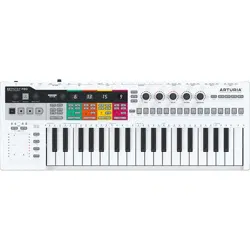Loading ...
Loading ...
Loading ...

4.2.10. The Main Encoders (5x)
The five main encoders (above Step buttons 2 to 10) are key to changing the parameters
of your patterns. They are somewhat different to standard encoders. Turn them slowly
and you'll notice that they have a slight 'detent': you'll feel a small click or series of clicks
whenever you move one.
Each of the five main encoders is surrounded by 15 red LEDs, each of which has eight levels
of brightness from dim red to bright red. If we take the Gate encoder as an example: first
turn it all the way counterclockwise, then turn it slowly to the right. The LED in the first
position will slowly increase in brightness and after eight clicks the second LED will light up
dimly and the dim-to-bright cycle will repeat. All in all, this gives you 128 distinct positions
for each of these encoders!
♪: The encoders are touch-sensitive: the moment you touch them, their current value will be
displayed in the OLED screen.
4.2.10.1. The Pitch Encoder
In Step Edit mode, the Pitch encoder will step through the pitches chromatically or, if you
have selected a scale by holding down the 'Shift' button and pressing the appropriate Scale
key, it will only step through the notes that belong to the scale you've selected.
4.2.10.2. The Gate Encoder
In Step Edit mode the Gate encoder enables you to set the gate length of the selected step.
Simply stated, the gate length is the ON time or duration of a note. It's a great feature:
imagine how a fast 12-step piano sequence sounds when steps 3, 6, 9 and 11 are sustained,
while the other steps are all short. This is something that only a very skilled pianist can
accomplish. In Arpeggio (Arp) mode, the Gate encoder functions as a global encoder that
simultaneously affects all gates in the currently activated arpeggio.
4.2.10.3. The Velocity Encoder
Velocity means the strength or force with which you hit a key. In the MIDI specification,
velocity values range from 0-127, where notes with a velocity of 0 to 50 or so are soft,
velocities of about 50 to 100 are medium, and a velocity above 100 is loud. In Utility>MIDI
Settings>Velocity Curve and the downloadable MIDI Control Center you can choose a
suitable velocity scaling.
In Arpeggio (Arp) mode, the Velocity encoder functions as a global encoder that
simultaneously affects all velocities in your arpeggio.
Arturia - User Manual Keystep Pro - KeyStep Pro Overview 41
Loading ...
Loading ...
Loading ...
